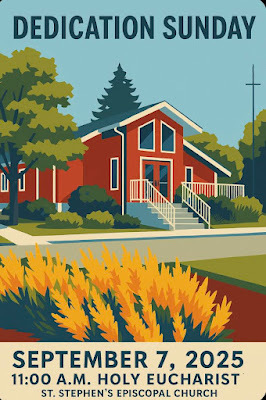Dedication Sunday

September 7, 2025
1 Kings 8:22-23,27b-30;
+ This past week, our candidatesfor the next Bishop of North Dakota were in the state.
On Tuesday St. Stephen’s showedup in force for the Meet and Greet at the Cathedral.
Several of the Candidates came upto me and said, “Wow! There are A LOT OF St. Stephen’s people here!”
We made up half of the gatheringof three congregations in town!
Then on Wednesday, we hosted abreakfast and tour of the church for the candidates before they left for a tourthrough the rest of the diocese.
After they ate, I showed them thechurch and explained to them how far St. Stephen’s had not only come in thelast 69 years, but also with in the last 15 years!
They were (I think) genuinelyimpressed with us.
And I even heard from them andothers who were there at the Clergy Meet and Greet on Thursday which I helpedfacilitate, that they were genuinely impressed with St. Stephen’s and all thatwe stand for and have been an advocate for.
We should all be very proud (in aholy and healthy way) about who we are and what we are.
It is this kind of place that wecelebrate today on our Dedication Sunday.
Why not, right?
It’s all very exciting.
I love Dedication Sunday.
And you know what I love evenmore than Dedication Sunday?
I especially love our scripturereadings for today.
I love all this talk of abuilding being God’s house.
I think we sometimes forget thatfact.
We forget that this is God’shouse.
God, in a very unique ways,dwells with us here.
But this is Sunday is more thanall these physical things.
It is about more than just abuilding, and walls, and vestments and paraments and holy water and incense.
It about us being theHouse of God.
It is about us being thetabernacles in which God dwells.
It is about us and our service toGod and others.
And you know what it’s really allabout.
It is about LOVE.
Yup, it’s gonna be another lovesermon.
Years ago, I read an amazingbiography of the American poet Denise Levertov, I came across this wonderfulquote, from another poet, St. John the Cross:
“In the evening of our lives, wewill be judged on love alone.”
Later I heard a friend of minecomment on that quote by saying
“we will be judged BY love alone.”
I love that!
That quote has been haunting mefor years.
And it certainly has beenstriking me to my core in these days leading up to our Dedication Sundaycelebration.
If this congregation could have amotto for itself, it would be this.
“In the evening of our lives, wewill be judged on(or by) love alone.”
Because this, throughout all ofour 69 year history, is what we are known for at St. Stephen’s.
Love.
We are known for the fact that weknow, by our words, by our actions, by our faith in God and one another, thatit is love that makes the difference.
And by love we will, ultimately,be judged.
That’s what the Church—thatlarger Church—capital “C” Church— should be.
But sometimes we forget what the Church should be.
This morning, there are manypeople here who have been wounded by that Church—the larger Church.
I stand before you, having beenhurt be the larger Church on more than one occasion.
And for those of us who are here,with our wounds still bleeding, it is not an easy thing to keep coming back tochurch sometimes.
It is not any easy thing to be apart of that Church again.
It is not an easy thing to callone’s self a Christian again, especially now when it seems so many people haveessentially highjacked that name and made it into something ugly and terrible.
A Christ-less Christianity.
And, speaking for myself, it’snot easy to be a priest—a uniform-wearing representative of that human-runorganization that so often forgets about love being its main purpose.
But, we, here at St. Stephen’s,are obviously doing something right, to make better the wrongs that may havebeen done on a larger scale.
We, at St. Stephen’s, (I hope) havedone a good job over these last 69 years of striving to be a positive exampleof the wider Church and of service to Christ who, according to Peter’s letterthis morning, truly is a “living stone”—the solid foundation from which wegrow.
We have truly become a place oflove, of radical acceptance.
As
God intends the Church to be.In these last 69 years, this parishhas done some amazing things, some truly radical things.
It has been first and foremost inthe Diocese of North Dakota in the acceptance women in leadership, when womenweren’t in leadership, when in fact there was open opposition to women servingas acolytes or Wardens or Lay reader or Deacons and Priests.
It was first and foremost in theDiocese in the acceptance of LGBTQ people, when few churches would.
It was the first parish in thisDiocese to do something as simple as changing its liturgy—the words of theseservice we use to worship God—to use language.
Doing so has been a source ofconsolation for people who have struggled with the false image of a vengeful,fearsome white male God.
And instead has shown us a trulyloving God who is so much bigger than all the images we can put on God, whichlimit God and make God in our image, rather than us in God’s image.
How many countless people whohave been hurt or abused by the church have spiritually limped through thatdoor and found a home here?
And not just a welcoming home.
But a home that includedthem, that saw them as one and equal with everyone else here, that not onlytold them, but showed them that they were truly loved Children of a loving,accepting God.
Seeing all this we needto give the credit where the credit is truly due:
the Holy Spirit.
Here.
Among us.
In our reading from First Kings today, we hearSolomon echoing God’s words, “My name shall be there.”
God’s very Name dwells here.
As we look around, we too realize that this istruly the home of God.
We too are able to exclaim, God’s name dwells here!
And, as I said at the beginning of my sermon, by“the home of God” I don’t mean just thisbuilding.
We’re the home of God.
Each of us.
We are the dwelling place of the Most High.
After all—God is truly here, with us, in all thatwe do together.
The name of God is proclaimed in the ministries wedo here.
In the outreach we do.
In the witness we make in the community ofFarg0-Moorhead and in the wider Church.
God is here, with us.
God is working through us and in us.
Sometimes, when we are in the midst of it all, whenwe are doing the work, we sometimes miss that perspective.
We miss that sense of holiness and renewal and lifethat comes bubbling up from a healthy and vital congregation working together.
We miss the fact that God truly is here.
So, it is good to stop and listen for a moment.
It is good to reorient ourselves.
It is good to refocus and see what ways we can moveforward together.
It is good to look around and see how God isworking through us.
Many of the ministries that happen here at St. Stephen’s go on clandestinely.
They go on behind the scenes, in ways most of us(with exception of God) don’t even see and recognize.
But that is how God works as well.
God works oftentimes clandestinely, through us andaround us.
This morning, however, we are seeing very clearlythe ways in which God works not so clandestinely.
We see it in the vitality here.
We see it in the love here.
We see it in the tangible things, in our altar, inthe bread and wine of the Eucharist, in our scripture readings, in our windows,in the smell of incense in the air, in our service toward each other. In US.
But behind all these incredible things happeningnow, God has also worked slowly and deliberately and seemingly clandestinelythroughout the years.
And for all of this—the past, the present and thefuture—we are truly thankful.
God truly is in this place.
This is truly the house of God.
WE truly are the house of God.
This is the place in which love is proclaimed andacted out.
So, let us rejoice.
Let us rejoice in where we have been.
Let us rejoice in where we are.
Let us rejoice in where we are going.
And, in our rejoicing, let us truly be God’s owntruly loved people.
Let us be God’s people in order that we mightproclaim, in love, the mighty and merciful acts of God to those who need tohear them and experience them in their own lives. Amen.



